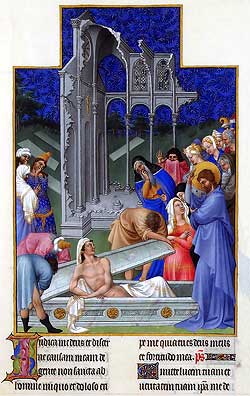I Samuel 3:3-10, 19
Samuel wis sleepin i the Temple o the Lord where the Ark o God wis, an the voice o the Lord says Samuel's name; an he says, "Here am A." An runnin tae Eli he says, "Here am A, for ye says ma name." An Eli says, "A didna say yer name; gae tae yer rest again." Sae he went back tae his bed. And again the Lord says, "Samuel." An Samuel got up an went tae Eli an says, "Here am A; for ye certainly says ma name. But he says i answer, "A says nothing, ma son; gae tae yer rest again." Now at thon time Samuel haed nae knowledge o the Lord, an the revelation o the word o the Lord hadna come tae him. And for the third time the Lord says Samuel's name. An he got up an went tae Eli an says, "Here am A; for ye certainly says ma name." Then it wis clear tae Eli the voice that says the child's name wis the Lord's. So Eli says tae Samuel, "Gae back: an gin the voice comes again, let yer answer be, 'Say on, Lord; for the ears o yer servant is open.' Sae Samuel went back tae his bed.
Then the Lord came an says as before, "Samuel, Samuel." Then Samuel made answer, "Say on, Lord; for the ears o yer servant is open."
An Samuel became older, an the Lord wis wi him an let nane o his words be without effect.
[Own translation, level 1 (22/12/23) methodology here]
Responsorial Psalm
Psalm 39 (40): 2, 4, 7-10, (resp. vv 8,9)
Till wark yer will, O my God,
but 'am fain!
Lang leukit I for the Lord;
an' he loutit till me,
an' he heard my skreigh.
An' a new sang pat he i' my mouthe,
nae less nor laud till our God:
Till wark yer will, O my God,
but 'am fain!
O' slachtir an' hansel, ye ne'er thought weel.
My lugs ye hae dreel'd:
brunt-offran hail, an' hansel for sin, ye wad nane o'.
Syne, Leuk, quo' I; mysel maun be!
Till wark yer will, O my God,
but 'am fain!
I' the braid o' the Buik, it's written o' me:
Till wark yer will,
O my God, but 'am fain; 'an' that bidden o' thine
's i' my bosom.
Till wark yer will, O my God,
but 'am fain!
Right-rechtin I cried
till the feck o' the folk;
my lips I ne'er steekit,
O Lord, ye wot:
Till wark yer will, O my God,
but 'am fain!
[From Psalm 40 in The Psalms: frae Hebrew intil Scottis P. Hately Waddell (1891) here]
Second reading
I Corinthians 6:13-15, 17-20
Noo e body's nae for hoorin, bit for e Lord, an e Lord for e body. God his baith reesed up e Lord an will reese up hiz bi his ain pooer. Div ye nae ken att yer bodies are pairt o e body o Christ? E lad att jines himsel till e Lord becomes the ae speerit wi him.
Haud clear o hoorin. Ony ither ill att a chiel dis is ootside his body, bit e lad att hoors aboot dis ill conter his ain body. Div ye nae ken att yer body is e kirk o e Haily Speerit, att's inno ye. Ye got it fae God, an ye're nae yer ain. He bocht ye for a price, sae glorifee God in yer body an in yer speerit -they belang tae God.
[From The Doric New Testament (2012), rendered in Doric by Gordon M. Hay, published by G. M. Hay, Longside, ISBN 978-0-9573515-0-9, author's website http://www.doricbible.com/, Amazon UK here, Amazon US here.]
Gospel reading
John: 1:35-42
Ane vthir day Johnne stude, and twa of his discipilis, And he beheld Jesu gangand, and said, 'Lo! the lambe of God.' And twa discipilis herd him spekand, and followit Jesu. And Jesus turnit, and saw thame followand him, and said to thame, 'Quhat seke ye?' And thai said to him, 'Rabbi (that is to say, Maistir), quhare duellis thou?' He sais to thame, 'Cum ye and se.' And thai com, and saw quhare he duellit; and duelt with him that day. And it was as the tent houre.
And Andro, the bruther of Symon Petir, was aan of the twa that herde of Johnne and had followit him. This fand first his bruther Symon, and he said to him, 'We haue fundin Messias, that is to say, Crist;' and he ledde him to Jesu. And Jesus beheld him, and saide, 'Thou art Symon, the sonn of Johanna; thou salbe callit Cephas, that is to say, Petir.'
[From The New Testament in Scots Murdoch Nisbet [c.1520] (1903) vol 2 here
John: 1:35-42
Ane vthir day Johnne stude, and twa of his discipilis, And he beheld Jesu gangand, and said, 'Lo! the lambe of God.' And twa discipilis herd him spekand, and followit Jesu. And Jesus turnit, and saw thame followand him, and said to thame, 'Quhat seke ye?' And thai said to him, 'Rabbi (that is to say, Maistir), quhare duellis thou?' He sais to thame, 'Cum ye and se.' And thai com, and saw quhare he duellit; and duelt with him that day. And it was as the tent houre.
And Andro, the bruther of Symon Petir, was aan of the twa that herde of Johnne and had followit him. This fand first his bruther Symon, and he said to him, 'We haue fundin Messias, that is to say, Crist;' and he ledde him to Jesu. And Jesus beheld him, and saide, 'Thou art Symon, the sonn of Johanna; thou salbe callit Cephas, that is to say, Petir.'
[From The New Testament in Scots Murdoch Nisbet [c.1520] (1903) vol 2 here


No comments:
Post a Comment